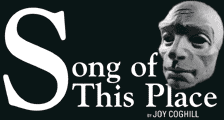
 | |
 |
|
Finding
the truth is not easy Article extracted from: UBC
Reports | Vol. 50 | No. 2 | Feb. 5, 2004 What do we read when we read auto/biography? And what exactly are we watching when we watch auto/biographical plays? We commonly expect to find the truth in auto/biographical narratives and plays. But, as one of UBC's experts in auto/biography studies explains, that expectation may not be entirely realistic. "Auto/biography is something compiled, written, or produced, by another human being, so it's a form of art in its own right," explains English professor Sherrill Grace. "And that is manifestly the case when we're talking about theatre, because there are all these other players who come in: playwright, director, actors, script, stage manager, lights and stage designer." According to Grace, auto/biographical plays have become more and more common in 20th century literature, but the interplay between theatre and auto/biography, and the reasons for the prevalence of the genre have still to be investigated. That is what an innovative exploratory workshop organized by UBC's English and Theatre departments with support from the Peter Wall Institute for Advanced Studies, the UBC Hampton Fund and the McLean Chair for Canadian Studies, has set out to do. The workshop, titled "Putting a Life on Stage", will explore the challenges of staging and performing auto/biography. It includes keynote lectures, panel sessions, and roundtable discussions featuring a stellar cast of scholars from around the world and some of Canada's most respected playwrights, including Sharon Pollock, Joy Coghill, Mavor Moore and Linda Griffiths. The focal point of the workshop is a performance of Song of This Place, by renowned UBC alumna Joy Coghill. The play, which explores a storyteller's struggle to portray B.C. artist Emily Carr on stage, is, according to director Robert More, "unique" in its approach and its courage to examine "the creative process and the artistic vision in itself." It contains both biographical and autobiographical elements, which are explored through the use of Bunraku-style puppets, or animated masks, held by manipulators visible to the audience. Four UBC students will give life to the 19 puppets.
|
"We're moving across a divide here, by involving students in a live play production," says Grace. "Working with Robert More, who is Canada's leading expert on puppets, they're getting a course in a very specialized area which is not part of the regular curriculum." For the students, this is an opportunity and also a challenge. "The manipulators are walking, listening apparati," explains More. "They must be an open channel to serve the mask and the script. All the acting dials must be dimmed down and the emotions released into the mask, so that the audience can believe the mask is a living breathing being." And that's not easy. Says More, "I can bring them technique, but that isn't going to make you go, 'God, that's Emily Carr,' and be astonished. They have to listen to the mask and respond, listen to the text and to their fellow actors, and be empathetic to everything around them. Learning to be that open and confident could take 20 years of acting." For Grace, this production of Song of This Place is an experiment, but also a way of bringing together two worlds. "This event doesn't fit into the academic mode and it bursts beyond the theatre production to bring the two together," she explains. "We tend to live in disciplinary solitudes, but it is exciting and mutually beneficial when academia and theatre meet." The workshop runs February 18-22. For more information, visit http://autobiography.arts.ubc.ca. |
| ...HOME | ||||||